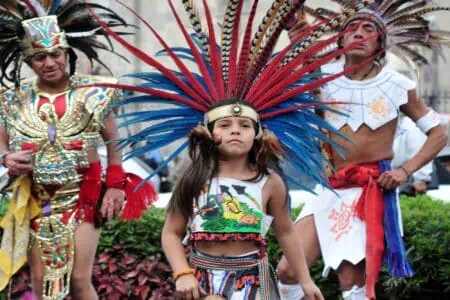Choosing a name is difficult. Everyone has an opinion, and you are bound to offend someone by not picking the name they suggest, or the name of your great-great-grandfather, or a name that reflects your heritage, or, well, you get the idea.
We know, we’ve been there. That’s why we put so much work into researching and compiling our name lists. Each list is carefully curated to provide you with reliable information and plenty of choices.
If you’re looking for a Hispanic or Latino name that reflects your family’s language or geography, you’ve come to the right place.
100 Spanish & Hispanic Names for Boys
Long or short, classic or modern, popular or uncommon, we have every type of Hispanic and Latino boy name.
Aarón
The origins and meaning of Aarón are uncertain.
Aaron, from which the Spanish form Aarón evolved, may have Egyptian origins. If so, it could mean “warrior lion,” or it may have evolved from Aaru, the name of a heavenly paradise ruled by Osiris.
Alternatively, Aarón may be a variation of Haran, which is Hebrew for “mountain” or “hill.” There’s no evidence Aaron means “enlightened,” “exalted,” or “mountain of strength,” as some websites suggest.
Adán
Adán, the Spanish form of Adam, means “man.”
Actor and director Adán Canto was born in Mexico and attended school in Del Rio, Texas. He first found success as a musician in San Antonio and Mexico City before moving into acting.
He has appeared in, among other things, “The Following,” “X-Men: Days of Future Past,” “Designated Survivor,” and “The Devil Below.”
Adelardo
From the Germanic name Adalhard, Adelardo means “brave, noble, hardy.”
A rare Hispanic name, there are roughly 1,253 Adelardos globally, with 278 of them in Brazil, 193 in Spain, and 76 in the U.S. There are also a handful of people named Adelardo in Argentina, Peru, Venezuela, Cuba, and Mexico.
Agapito
Agapito is the Spanish form of Agapitus, meaning “beloved.”
Agapitas of Palestrina was 16 years old when the Roman Emperor Aurelian sentenced him to death for being a Christian. Legends say he was thrown into an arena of ferocious beasts, none of whom would approach him. He was later beheaded.
The Spanish form of the name became popular in Hispanic cultures after Agapito, as he is also referred to, was venerated as a Saint. He is celebrated every year on August 18th.
Alberto
Alberto comes from the Germanic name Adalbert, meaning “noble and bright.”
The Hispanic and Latino name Alberto is pronounced “al-BEHR-to” in Spanish, “al-BEHR-too” in European Portuguese, and “ow-BEKH-too” in Brazilian Portuguese.
At #678 in the U.S. top 1,000 boy names, Alberto is now almost as popular as its Germanic cousin, Albert, which is currently ranked at #523 in the charts.
Alcides
Alcides is Greek in origin and means “son of strength.”
Alcides was the birth name of the ancient Greek hero, Heracles, known in Roman mythology as Hercules. This makes Alcides a suitable alternative to Hercules that can also be viewed as a slightly “out-there” name.
Alfonso
Alfonso is from a Germanic name that means “noble and ready.”
Actor, director, comedian, and host of “America’s Funniest Home Videos,” Alfonso Ribeiro is known for his role as Carlton Banks in “The Fresh Prince of Bel-Air.” However, his first significant role was in the Broadway musical “The Tap Dance Kid.”
Bautista
The Spanish name Bautista means “to dip.”
Bautista comes from the French name Baptiste, which itself comes from the Greek βάπτω, or bapto, meaning “to dip.”
Bautista became popular as a name used in honor of Saint John the Baptist, but is now more often seen as a surname.
Benicio
A form of Benedict, Benicio means “blessed.”
Until recently, the name Benicio, written as Benício in Portuguese, was relatively unknown outside Brazil. That was until Puerto Rican actor Benicio del Toro won awards for “The Usual Suspects” in 1995.
Since then, the name Benicio has grown in popularity, overtaking the English language version, Benedict, in the U.S. in 2016.
Borja
Borja has Arabic roots and means “tower.”
This Hispanic forename for boys began as a geographical surname, used for people from the Spanish town of Borja.
The prominent Italian House of Borgia traces its history back to Borja. Still, Borja’s most recent brush with fame is as the location of a botched fresco restoration that went viral (1).
Calixto
The Spanish name Calixto means “most beautiful.”
The municipality of Calixto García is located in the Holguín Province of Cuba. It was named after Cuban war hero General Calixto García Iñiguez.
Garcia was the target of an 1899 U.S. publication extolling the importance of initiative and conscientiousness. “A Message to Garcia”’ was so popular that “taking a message to Garcia” became slang for taking on a difficult task.
Carlos
Carlos is a Spanish and Portuguese name, meaning “man” or “warrior.”
Carlos is the 26th most common name in the world. There are over 1.5 million people named Carlos in Brazil and 1.2 million in Mexico.
In the U.S., this version of Charles peaked in popularity in 2001, when 6,842 babies were given the name, making it the 59th most common name that year.
César
César is from a Latin nickname, meaning “hairy.”
After a stint as National Director of the Community Service Organization, César Chavez helped to co-found the National Farm Workers Association (NFWA), which later became the United Farm Workers union.
“César Chávez,” a 2014 movie about his life, stars Michael Peña, America Ferrera, and Rosario Dawson. Directed by Diego Luna, it also features producer John Malcovich in a supporting role.
Cristóbal
The Spanish name Cristóbal means “bearing Christ.”
Cristóbal Magallanes Jara was a priest, killed on his way to celebrate Mass. Magallanes was falsely accused of inciting rebellion during the 1926-1929 Cristero War.
His last words were: “I die innocent, and ask God that my blood may serve to unite my Mexican brethren.” His life is celebrated on May 21st each year.
Darío
Darío is from the Greek name Darius, meaning “possessing goodness.”
Argentinian footballer Darío Benedetto currently plays for Spanish Premier League team Elche Club de Fútbol, S.A.D. The striker also plays for Argentina’s National Football team and became a naturalized Mexican citizen in 2015.
Davi
Davi is the Portuguese form of David, meaning “beloved.”
Davi is a relatively popular boy name in Portugal and Brazil. However, in Indonesia and the U.S., it has seen an increase in use as a unisex name. In India and Malaysia, it is predominately a girl name.
Diego
Diego is a Spanish boy name of disputed meaning.
One theory about the meaning of Diego is that it is a shortened form of Santiago, which means “Saint James.” The alternate theory is that because Diego was written in Latin records as Didacus, it is from the Greek word Didache which means “teaching.”
Donato
The Spanish name Donato means “given.”
Villa Donato Guerra, in the Mexican state of Donato Guerra, is named after the Mexican Army leader of the same name.
It was originally the territory of the Mazahua people until the Mexica took over in the 15th century.
Eduardo
Eduardo is the Spanish and Portuguese form of Edward and means “rich guard.”
The Spanish and Portuguese name Eduardo is a form of Edward, from where we get the meaning. An alternative form, also popular in Portugal and Brazil, is Duarte.
These variations provide lots of scopes to honor a family member by naming your child with one of the many forms of Edward.
Efraín
Efraín is from the Hebrew name Ephraim, meaning “fruitful.”
Mixed martial arts fighter Efrain Escudero won the Spike channel’s reality TV show “The Ultimate Fighter.” Escudero left Grand Canyon University, where he was a collegiate wrestler, to appear on the show.
After leaving the show, he returned to University and completed his Bachelor of Science in Criminal Justice.
Elías
The Icelandic and Spanish form of Elijah, Elías means “my God is Yahweh.”
Mount Saint Elias sits astride the border of Alaska and British Columbia. In Tlingit, the mountain is called Yasʼéitʼaa Shaa, which translates into English as “Mountain behind icy bay.”
The documentary “Mount St. Elias” tells the story of a team of mountaineering skiers who plan to scale the mountain and ski back down all 18,000 feet, a World Record for the world’s longest skiing descent.
Emilio
Emilio is from the Latin word aemulus, meaning “rival.”
Born in the Bronx, American writer, actor, and director Emilio Estevez is the oldest child of Ramón Antonio Gerardo Estévez — better known as actor Martin Sheen. Emilio is the brother of Carlos Irwin Estévez — professionally known as Charlie Sheen.
Enrique
Enrique is from the Germanic name Heimirich, meaning “home-ruler.”
Fans of traveling may want to consider the name Enrique, not for its meaning, but because of Enrique of Malacca.
Kidnapped into slavery at the age of 14 by Portuguese explorer Ferdinand Magellan, Enrique was the first person to circumnavigate the world.
He traveled with Magellan on all of his expeditions and is thought to have returned to his native Malaysia after Magellan’s death.
Epifanio
From the Greek word epiphaneia, Epifanio means “appearance, manifestation.”
Epifanio is a name connected to the Epiphany, which Christians celebrate on January 6th. As a result, the name Epifanio was traditionally given to boys born on that date.
The name is a cousin of the Ancient Greek Theophanes, from which we get the girl name Tiffany.
Ernesto
The Spanish name Ernesto means “serious.”
Ernesto has been on a roller-coaster ride of popularity since it first appeared on the U.S. top 1,000 boy names list in the early 20th century.
Much of Ernesto’s resurgence in popularity is because it’s the forename of Ernesto “Che” Guevara. Parents making a social statement named their child Ernest or Ernesto, providing the offspring with a usable name for adulthood.
Esteban
From the Greek name Stephanos, Esteban means “crown, wreath.”
Pittsburgh-born guitar player Stephen Paul is better known by the mononym, Esteban.
To begin with, the self-taught guitarist had a focus on classical music. However, his desire to share music with as many people as possible caused a course change, and he branched out into playing other styles, creating his own guitars, and teaching others to play.
Fabián
Fabián is from an Ancient Roman name, meaning “bean.”
Lots of people give their unborn babies nicknames when talking to them in the womb, and the most popular of these nicknames is bean.
We think Fabián is an excellent choice for keeping the nickname going in a form that is usable throughout life.
Facundo
Facundo is from the Late Latin Facundus, meaning “eloquent.”
Historically, parents name their children in the hope of bestowing specific attributes upon them.
In some cases, parents choose the name of an ancestor, both to honor that person and in the hope their child would grow up to be just like them. And sometimes parents choose a name because of its meaning. In this case, Facundo is ideal.
Feliciano
Feliciano is from the Roman name Felicianus, which means “lucky, successful.”
Feliciano is a Spanish, Portuguese, and Italian evolution of Felix, which was a Roman agnomen or nickname.
Because of its positive meaning, Feliciano was a popular name among early Christians, who still adhered to many of the Roman naming practices. There are eight Roman Catholic saints named Feliciano.
Felipe
Felipe is the Brazilian Portuguese and Spanish form of Phillip and means “friend of horses.”
Felipe has long been a name associated with royalty, from Filipe I in 1506 to the current King of Spain, Filipe IV.
The downside of this serious and regal name is that a generation of children will associate the name Filipe with the screwdriver character on the Disney CGI animation series “Handy Manny.”
Fidel
Fidel is from the Late Latin name Fidelis, which means “faithful.”
We were determined not to do the obvious thing and mention Fidel Castro, but after spending over two hours looking for another Fidel to write about, we gave up.
With that in mind, be aware that although Fidel is a fine name, your child may spend a lifetime hearing people say things like “What, like Fidel Castro?”
Francisco
This Spanish and Portuguese version of Francis means “Frenchman.”
Considered the most important Spanish painter of the late 18th and early 19th centuries, Francisco Goya began his professional life as a court painter to the Spanish Monarchy.
In later life, his work covered much darker subject matter, combining his observations on political and religious corruption and his fears about his declining health.
Gabriel
Gabriel is a Hebrew name. It means “God is my strongman.”
In Christianity, Islam, and Judaism, Gabriel is an archangel.
Among other things, Christians believe Gabriel visited the Virgin Mary to foretell of the birth of Jesus. Muslims believe him to have dictated some of the Quran to Mohammad. And in Judaism, Gabriel is considered the guardian angel of Israel.
Gael
Gael is a Breton term used to describe some Gaelic speakers.
The Gaels have a language and culture that includes the Irish, Scottish, and Manx Gaelic peoples. Although similar, each of the four branches has its own distinct dialects and vocabularies.
As with the name Francis, which means “Frenchman,” Gael began as a general term, then became a nickname, and eventually morphed into a given name.
Gilberto
An evolution of the Germanic name Gilbert, Gilberto means “bright pledge.”
The Spanish pronunciation of this name is “kheel-BEHR-toe” while the Italian form has the same spelling but is pronounced “jeel-BEHR-toe.”
Native English speakers tend to pronounce this “GILL-bert-o,” so be aware that if you live in a predominantly English-speaking area, you’ll spend a lot of time making corrections.
Gonzalo
The Spanish name Gonzalo means “battle” and something unknown.
The name Gonzalo evolved from the Medieval name Gundisalvus. This, in turn, was a Latin form of a Germanic name beginning with Gund, which means “war,” and another unknown element, which is why the full meaning of Gonzalo is unknown.
Guadalupe
Guadalupe means “valley of the wolves.”
The name Guadalupe moved from a feminine Hispanic name to a unisex Hispanic name after the 16th-century Mexican man Juan Diego experienced a series of Marian apparitions.
The tilma or cloak Juan Diego wore was impressed with an image of the Virgin and was enshrined within the Basilica of Our Lady of Guadalupe in Mexico City.
Guillermo
The Spanish form of William, Guillermo means “will” or “helmet.”
Director, producer, screenwriter, and author Guillermo del Toro is known for his unique way of fusing fairy tales, fantasy, and horror with a generous helping of religious symbolism and insectile imagery.
His fame has made it easier for people to pronounce Guillermo, which means those with the name spend less time correcting mispronunciation!
Hector
Hector is from a Greek name, Hekto, which means “holding fast.”
Hector is the name given to a cumulous thundercloud, nicknamed Hector the Convector. Almost every afternoon, from September to March every year, Hector forms over Australia’s Tiwi Islands. The storm reaches heights of roughly 66,000 feet.
We think this makes Hector the ideal name for a child who has already demonstrated a thunderous personality in the womb.
Hugo
A Latinized form of Hugh, Hugo means “mind, spirit, heart.”
While Hugo isn’t seen as a Hispanic name, it is popular in multiple Latino and Hispanic cultures. Argentina, Mexico, and Brazil are the three countries with the most people named Hugo.
However, this popularity is widespread, and in 2020, Hugo was in the top 50 boy names in over 25 countries.
Humberto
Humberto is a form of Humbert, a Germanic name, meaning “bright warrior.”
Research scientist Humberto Fernández-Morán Villalobos is the inventor of the diamond knife. With an exceptionally sharp edge, these knives are essential for vision-correcting refractive eye surgery and for preparing samples for electron microscopy.
Fernández-Morán Villalobos also worked on nuclear research in Venezuela and the Apollo project with NASA. He’s an excellent namesake for would-be scientists.
Íñigo
Medieval Spanish name Íñigo probably means “my little.”
Until the cult classic book and movie “The Princess Bride,” Íñigo was unfamiliar outside Hispanic communities and families.
However, since the release of the 1987 movie, the name has become famous because of the iconic lines “Hello. My name is Íñigo Montoya. You killed my father. Prepare to die.”
Isaías
The name Isaías is from a Hebrew name, meaning “Yahweh is salvation.”
The popularity scales reached their tipping point toward Isaías in 2009 when it overtook its traditional English language cousin, Isaiah, in the top 1,000 boy names charts in the U.S.
Since then, Isaiah has fallen off the charts entirely, last appearing in 2013, while Isaías continues to climb in popularity, reaching its highest point yet, #472, in 2020.
Jacinto
Jacinto evolved from the name of the hyacinth flower.
Jacinto is one of the rarer Latino names with few variants in other languages.
There are the Greek variations based on Hyacinth, the French Hyacinthe, the Italian Giacinto, the Hungarian Jácint, and the Polish Jacek and Jacenty.
If you want a Spanish boy name that links to a robust female role model, the feminine form is Jacinda, as in New Zealand Prime Minister Jacinda Arden.
Jair
In Hebrew, Jair means “he shines.”
The name Jair appears to be pretty divisive. It’s one of those “love it or hate it” names, with few opinions between. Be prepared for lots of views if you choose this short, stylish Latino boy name.
Javier
The Spanish name Javier means “the new house.”
Javier is the Spanish variation of Xavier. In English-language-dominant countries and communities, we think Javier is by far the easiest of the two forms.
Why? Because, apart from minor regional variations, Javier has one standard pronunciation: ha-BYEHR. Thanks to “X-Men,” Xavier now has several pronunciations, and correcting people can quickly become tiresome.
Jesús
Jesús is the Spanish and Catalan form of Jesus.
In 2016, the last year for which we have reliable data, Jesús was the third most popular Mexican boy name, up by six places since the previous reliable chart in 2013.
The Mexican charts cover all births registered in-country, and this placement of Jesús is without including spelling variants such as the unaccented form, Jesus.
Joaquín
Joaquín is the Spanish form of Joachim.
If you play word association with the name Joaquín, the general population is most likely to respond with “Phoenix” because of actor Joaquín Phoenix. Born in San Juan, Puerto Rico, Joaquín’s surname at birth was “Bottom,” making the word association answer much more giggle-inducing.
Phoenix does not have any Hispanic heritage. However, he was born in Puerto Rico where his parents were missionaries in a religious cult — The Children of God.
Jorge
Jorge is from the Greek word georgos, meaning “earth-worker.”
Jorge is the Spanish and Portuguese form of George. Although it has the same spelling in each language, the articulation is quite different.
The Spanish pronunciation is “HAWR-hey” and is clearly different from its English-language cousin George. In Brazilian Portuguese, it’s “ZHAWR-zhee” while the similar European Portuguese is “ZHAWR-zhi” — both of which can be mistaken for Georgie.
José
The Spanish and Portuguese name José is a form of Joseph.
*We list José as a Latino boy name, but with a small note. In some cultures, José is sometimes a middle name for a girl or the second part of a hyphenated double name, most often Maria-José. Also, it is not unusual to see a boy with the name José-Maria.
Juan
Juan is from the Hebrew name Yochanan, meaning “Yahweh is Gracious.”
Juan is the Spanish and Manx form of John and is one of the most commonly used boy names in Spanish-speaking countries worldwide.
Juan is also very popular in Brazil — a Portugese-speaking country. So although it is generally considered Hispanic because it is a Spanish-language name, it can also be thought of as a Latino boy name.
Julio
Julio may be from the Greek word ioulos, meaning “downy-bearded.”
Because it is the Spanish equivalent of July, Julio is frequently used as a Hispanic boy name for babies born in the seventh month of the year.
The month of July was named after Jupiter, the supreme god of Roman mythology. His name is thought to mean “father of Zeus,” making this an alternative meaning for Julio.
León
The Hispanic boy name León is from the Greek word leon, meaning “lion.”
The city of León, capital of the province of the same name in Spain, was established by a Roman legion in around 29 B.C. They named the settlement León, from the word legionis, which means legion, making the city’s name entirely separate from the later Spanish boy name.
Lope
The Spanish name Lope is from the Roman Lupus, meaning “wolf.”
Novelist, poet, and playwright Lope de Vega published so much work he was nicknamed “Monster of Nature” and “The Phoenix of Wits.”
Considered second only to Miguel de Cervantes in Spanish literature de Vega is also seen as one of the best Spanish language lyric poets and one of the greatest dramatists in the history of European literature.
Manuel
Manuel is a form of Hebrew name Immanu’el, meaning “God is with us.”
Often shortened to Manny, Manu, or Nelinho, Manuel is a popular boy name in Spanish and Portuguese-speaking countries and much of the world’s German, Italian, and French-speaking areas.
You may encounter the occasional Manoel in Portuguese-speaking Brazil, but this is simply an archaic spelling variant rather than a separate name.
Marcelo
Marcelo is from the Roman name Marcus, meaning “male.”
If you like the name Marcelo but are reluctant to choose it because of its frequent use, consider one of the alternative forms.
The English-language name Mark is more of a cousin to Marcelo rather than a different form. Still, the French Marceau, Basque Martzel, and German Marzell are simply language-specific variations of the same name.
Mateo
Mateo is from the Hebrew name Mattityahu, meaning “gift of Yahweh.”
Mateo became especially popular after Catholic priest Mateo Correa Magallanes was martyred in 1927. Arrested by the government, Magallanes was imprisoned, then given the “opportunity” to hear the confessions of other prisoners.
After hearing the confessions, Magallanes was told to share what he heard with General Eulogio Ortiz. When he refused to do so, Magallanes was executed.
Maximiliano
From the Latin name Maximus, Maximiliano means “greatest.”
Maximiliano has been steadily growing in popularity in the U.S. since 2000, when it was #940 on the top 1,000 boy name charts. By 2020, it has risen to #263, with 1,281 newborns having the name.
Miguel
From the Hebrew name Mikha’el, Miguel means “who is like God?”
If you’re looking for a Hispanic boy name with literary overtones, you could do worse than choosing the forename of Spanish poet and novelist Miguel de Cervantes Saavedra.
Considered the world’s most excellent Spanish-language writer, Cervantes published his most famous work, “Don Quixote,” in two parts. “Don Quixote” is regarded as the first example of what we consider the modern novel.
Miguel Ángel / Miguelángel
Miguel Ángel is the Spanish form of Michelangelo.
People unfamiliar with the name may see this as a forename and middle name combo when it’s really a single name. Used initially to honor the archangel Michael, some people may consider Miguel Ángel too elaborate or too old-fashioned for a modern child.
Actor Miguel Ángel Silvestre belies this concern, being successful on both sides of the U.S./Mexico border.
Moreno
Moreno is Spanish for “dark.”
In addition to being a Spanish and Italian name, seen most often in Italy, the Vatican City, the U.S., and Brazil, Moreno is also a genus of spiders.
Discovered in 1940, these ground spiders have six species, the most recent being discovered in 2016. Moreno spiders are found only in Chile and Argentina.
Norberto
Norberto is from Germanic name elements, meaning “north” and “bright.”
Seen by many people today as an old-fashioned, old man name, we think Norberto is the ideal combination of a Hispanic boy name and an old-man-chic name.
Norberto is plain and well-recognized enough not to raise any eyebrows but unusual enough to ensure your little man is unlikely to bump into another Norberto in the schoolyard.
Octavio
Octavio is from a Roman family name that means “eighth.”
Traditionally a family’s eighth child, or sometimes the eighth son, was named Octavio.
These days, we’re all less likely than ever before to have four children, let alone eight or more (2). Perhaps Octavio can be reimagined as the perfect name for a baby born in the eighth month, August, or on the eighth day of any other month.
Pablo
The name Pablo comes from the Roman name Paulus, meaning “small” or “humble.”
Possibly the most internationally famous bearer of this name is Picasso. However you’re unlikely to want to use his full name: Pablo Diego José Francisco de Paula Juan Nepomuceno María de los Remedios Cipriano de la Santísima Trinidad Ruiz y Picasso.
Paco
Paco began as a nickname for Francisco, meaning “Frenchman.”
Paco is an unlikely-sounding nickname for Francisco, but legend says that Paco evolved because of the founder of the Franciscan Order, Francis of Assisi.
The story goes that members of the order wrote his name as “father of the community,” which translates as “Pater Communitatis.” The first syllable of each word was taken and combined to make Paco.
Pascual
The Hispanic name Pascual means “relating to Easter.”
The Latin word Pascha, meaning “Easter” was taken from the Hebrew פֶּסַח, or Pesach, meaning “Passover.” This makes Pascual an especially appropriate name for a child born at both Easter or Passover.
Pedro
Pedro is from the Greek Petros, meaning “stone.”
Pedro is both the Spanish and the Portuguese form of Peter, which means it is related to other forms of Peter such as the English Piers, the Basque Peru, the Hawaiian Pika, the Irish Peader, and the Serbian Pero.
Pepe
Pepe is from the Hebrew Yosef, meaning “he will add.”
Pepe is an affectionate pet name for those named Joseph, or its Spanish equivalents Jose and José.
People’s associations with Pepe are predominantly influenced by age. At the same time, older people may associate Pepe with the Warner Brothers’ French character Pepé Le Pew, while generation Z are more likely to associate it with the Pepe Frog meme.
Rafael
From the Hebrew name Rafa’el, Rafael means “God heals.”
Professional tennis player Rafael “Rafa” Nadal Parera is considered by some to be the greatest tennis player of all time, primarily because of his skill on all court surfaces.
Consequently, this Spanish boy name is likely to be one of the top picks for any tennis fan.
Ramiro
From Visigothic name elements, Ramiro means “advice, famous.”
The highest density of the Spanish and Portuguese boy name Ramiro is in Bolivia, where one in 62 people of all ages have this moniker.
Ramiro was often given in honor of Saint Ramirus of the Saint Claudius Monastery in Leon. He was executed by the Visigoths who opposed his Christianity.
Raúl
Raúl is from a Norse name, Ráðúlfr, which means “counsel, wolf.”
In addition to being an evolution of the Norse name Ráðúlfr, Raúl is also a form of the English-language name Ralph.
Reynaldo
Reynaldo is from the Germanic name Reginald, meaning “advice, rule.”
Retired Brazilian professional footballer Reynaldo dos Santos Silva is known better by the single name Reynaldo. The forward began his career in 2009 at Belgian club R.S.C. Anderlecht and retired in 2021.
Ricardo
The Spanish form of Richard, Ricardo means “brave ruler.”
Actor Ricardo Montalbán was known to millions of U.S. TV fans as Mr. Roarke in the series “Fantasy Island,” but he also appeared in multiple movies, including “Star Trek II: The Wrath of Khan.” Therefore, Ricardo may be a popular choice with grandparents.
Montalbán was also known to a new generation for his role in the “Spy Kids” movies and multiple voice-overs.
Rodrigo
Rodrigo is from the German name Roderick, meaning “famous ruler.”
Rodrigo Díaz de Vivar was the full name of the medieval Spanish knight and warlord, more commonly known as El Cid.
A national icon in Spain, he continues to be a popular folklore figure in everything from movies and TV series to books, video games, and animated kids TV shows.
Rolando
The name Rolando is the Spanish and Portuguese form of Roland, meaning “famous land.”
Fans of minor cult video games may consider Rolando as their boy name of choice as a nod to the classic iPhone game of the same name.
Rosendo
Rosendo is from a Visigothic name, meaning “famous path.”
Although there are only just over 11,000 people named Rosendo in the United States, the name has made occasional appearances on the Top 1,000 boy names list. The last time was in 1974 when it was the #979th most popular name and was given to 70 babies in the country.
Salvador
From the Late Latin Salvator, Salvador means “savior.”
The country of El Salvador was initially named San Salvador, or “Holy Saviour” by Pedro de Alvarado.
Alvarado later changed the name to the “slightly” less user-friendly Provincia De Nuestro Señor Jesus Cristo, El Salvador Del Mundo or “Province of our Lord Jesus Christ, the Saviour of the World.” In the post-federal period, El Salvador was chosen as the best option.
Sancho
The Spanish and Portuguese name Sancho means “saintly, holy.”
Sancho Panza is Don Quixote’s squire in the book of the same name. Known in the book for his “sanchismos,” Panza’s jokes, Spanish proverbs, and unyielding realism set him up as the first example of what we now call a sidekick.
However, his sidekick status gives rise to the slang term Sancho — a “man on the side” for a married woman.
Santiago
Santiago is a Hispanic boy name, meaning “Saint James.”
Santiago is the patron saint of Spain, and since 2009, it has been the number one boy name in Mexico. It has also risen in popularity in the U.S., peaking at #71 in 2020.
Santos
Santos means “saints” in Spanish.
It may come as a surprise to hear that the country with the most people named Santos is India. That’s because Santos is also an alternate spelling for the Hindi name Santosh, from the Sanskrit संतोष, or santosha, meaning “contentment, satisfaction.”
Saúl
Saúl is from a Hebrew name, Sha’ul, meaning “prayed for, asked for.”
Saul Hudson is better known as the British-American songwriter, record producer, and musician Slash.
A frequent fixture on “Greatest Guitar Players of All Time” lists, several of his riffs and solos have also been elevated to legendary status, namely those in “November Rain” and “Sweet Child O’ Mine.”
Teódulo
The Spanish form of the Greek name Theodoulos, Teódulo means “slave of God.”
Teódulo is an extremely rare Spanish name. So rare, in fact, that in 2014, the last time there was a reliable count, only 22 people in the world were recorded as having this name.
Nine of those people were in Mexico, four in Peru, and three in Brazil.
Tercero
Tercero means “third” in Spanish.
As the Spanish word for “third,” Tercero was traditionally given to the third child if it was a boy. If the third child were a girl, Tercero would be given to the third son.
Tiburcio
From the Roman name Tiburtius, Tiburcio means “of Tibur.”
Tibur was a town in central Italy, roughly 19 miles outside of the city of Rome. What was called Tibur is now known as Tivoli, and for the Ancient Romans, it was a popular resort town.
In European Spanish, Tiburcio is pronounced “tee-BOOR-thyo,” while in Latin American Spanish, it is “tee-BOOR-syo,” without the slight lisp sound on the final syllable.
Tomás
The Spanish name Tomás means “twin.”
Tomás is a gorgeous Latino boy name and a beautiful alternative to the English-language Thomas. It is sometimes listed as a Gaelic form of the name, but while the spelling is the same, the accentuation is different, with the Gaelic form being Tòmas.
Toño
Toño is a Spanish affectionate form of Antonio.
The meaning of Antonio, its root name Anthony, and subsequently Toño, is unknown. It is sometimes said to mean “praiseworthy” or “priceless,” but there is no evidence supporting it.
Another incorrect meaning arose when the name was linked to the Greek word anthos, meaning “flower.” This association led to the “h” being added to the original Roman name Antonius.
Toribio
Toribio is the Spanish form of Turibius, a name of unknown meaning.
Researchers are still trying to pin down the origins and meanings of Toribio. It’s tricky because the Romans would Latinize Greek names, and the original meanings could be lost.
However, we adore the current theory that Toribio could be from the Greek word thouros, meaning “furious, impetuous, rushing,” and either bia, meaning “force, (bodily) strength,” or bios, meaning “life.”
Tulio
A form of the Roman family name Tullio, Tulio is a name of unknown meaning.
Tulio is a Spanish name, and the Portuguese form is Túlio. However, although Portuguese is the official language of Brazil, the Spanish form of the name Tulio is the most popular of the two in the most populous country in South America.
Urbano
Urbano is a Spanish name that comes from the Latin name Urbanus, meaning “city dweller.”
Urbano is also an umbrella term that includes several categories of Latin music. The six central genres of urbano are Brazilian funk, dembow, Spanish hip hop, Latin trap, reggaetón, and urban champeta.
We think this makes Urbano a suitable choice for music fans or those who want a boy name that will bestow musical attributes.
Valente
From the Roman nickname Valens, Valente means “healthy, vigorous, strong.”
The Roman nickname Valens evolved into the Roman surname Valentine. The 3rd-century martyr Saint Valentine died on the eve of the Roman event of “Lupercalia,” a fertility festival.
This is how Saint Valentine, and his feast day February 14th, became associated with love.
We think this makes Valente an excellent alternative to Valentine, but with the same meaning and connotations of love.
Valero
Valero is a Spanish form of Valerius, which means “strong.”
Saint Valero of Saragossa, also known as Saint Valerius, was the bishop of the Spanish city of Zaragoza. Valero was persecuted for his faith and sent into exile, eventually dying in Zaragoza, hence his patronage.
The name Valero is rarely heard outside Spain and is occasionally used as a girl name.
Vasco
Vasco is a Spanish name, evolved from Velasco. It means “Basque.”
The Basque country is found straddling the border of what we now call Spain and France. The Basque people have their own culture and language, distinct from the national identity of the country in which they live.
Some people claim Velasco is the Basque word for “crow,” but we were unable to find evidence to prove whether this was true or not.
Venceslás
Venceslás is from the Czech and Slovak name Václav, meaning “more glory.”
Venceslás became a popular name in what we now call Spain, in honor of the patron saint of the Czech Republic, Saint Václav.
In English, Saint Václav is commonly known as King Wenceslaus and was known for his kindness, sound virtue, and dedication to the peaceful resolution of conflict.
He is also the subject of the Christmas carol “Good King Wenceslas.”
Vicente
From the Roman word vincere, Vicente means “to conquer.”
Vicente Guerrero was one of the members of the Provisional Government of Mexico from 1823 to 1824 and was the second president of the First Federal Republic. Guerrero abolished slavery, called for public schools, and put forward other liberal policies.
A national Mexican hero, with the state of Guerrero named to honor him, owners of this name can be proud.
Victoriano
The name Victoriano is from the Roman name Victor, meaning “the victor.”
While Victoriano is an excellent Hispanic name, many Mexicans view it with disgust because of Victoriano Huerta.
Huerta, the 39th President of Mexico, came to power as the result of a U.S. and German Empire aided coup d’état. The subsequent U.S. administration refused to recognize Huerta and made arms sales to anti-Huerta forces.
Vidal
Vidal evolved from the Latin Vitalis, which means “vital, full of life.”
Although Vidal is Spanish, it is more specifically a Ladino name. Ladino is an evolution of Old-Spanish, which began in the 15th-century when the majority of the Jewish population that failed to convert to Christianity were expelled.
When the population, known as Shepardi Jews, settled elsewhere, they maintained their Spanish language, which evolved separately from the Spanish in Spain.
Vinicio
Vinicio is thought to be from the Latin word vinum, meaning “wine.”
You will frequently see Vinicio listed as meaning “of the wine fields” or similar, but this is a random lengthening without any evidence or support.
This lengthening probably happened when someone was asked the meaning of the name and elaborated the true meaning to make it sound more exciting or interesting.
Wálter
Wálter is the Spanish form of Walter, meaning “ruler of the army.”
Wálter is currently a Spanish and Portuguese boy name, but in the past, it was also a popular Victorian girl name.
Yago
Yago has a complex history, and its meaning is disputed.
Yago is the Spanish form of Jacob, which evolved from the Latin name Iacob, from the Greek name Lakob which, in turn, comes from the Hebrew name Ya’aqov.
Ya’aqov may have evolved from something like Ya’aqov’el, a theoretical name, meaning “may God protect.”
Other theories say Jacob, and thus Yago, means “holder of the heel” because the Biblical Jacob is said to have been born holding onto his brother’s heel.
Zacarías
The Spanish form of Zechariah, Zacarías, means “Yahweh remembers.”
Zacarías is a rare Spanish moniker with only around 48 people in the world known to have the name.
Spain has 27 of those people, with seven in Mexico and the other 14 scattered between 10 different countries.



































